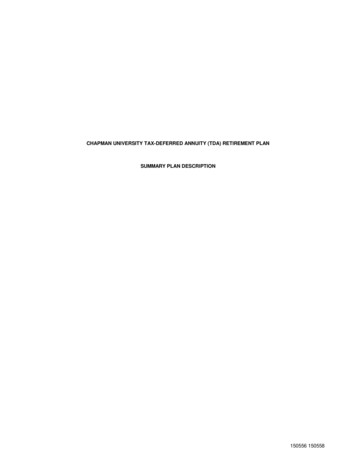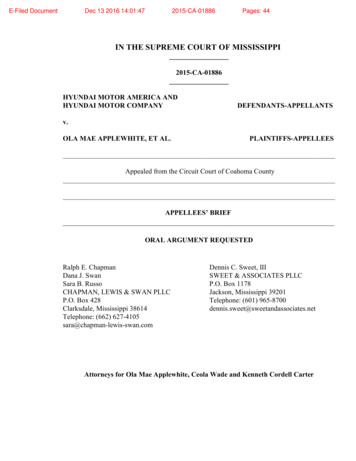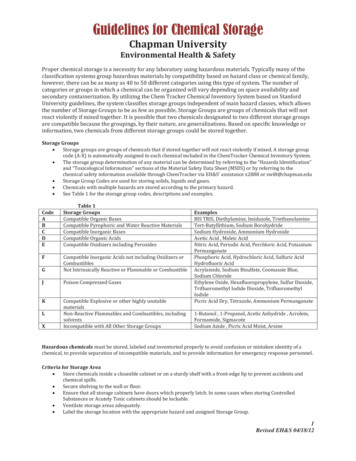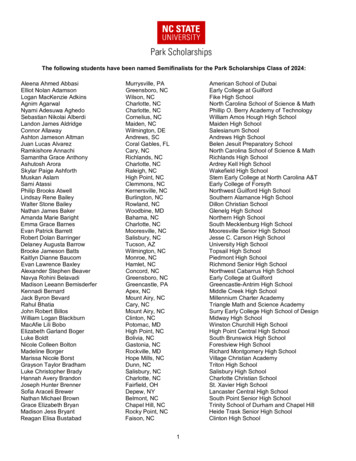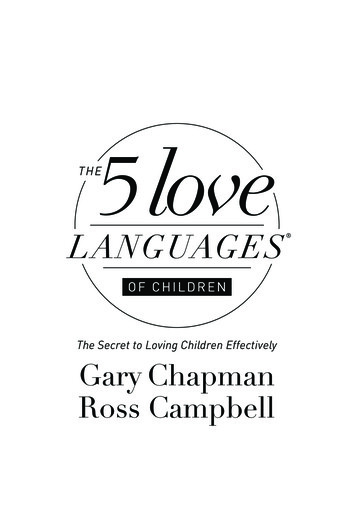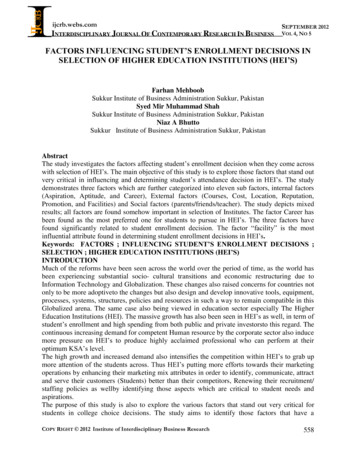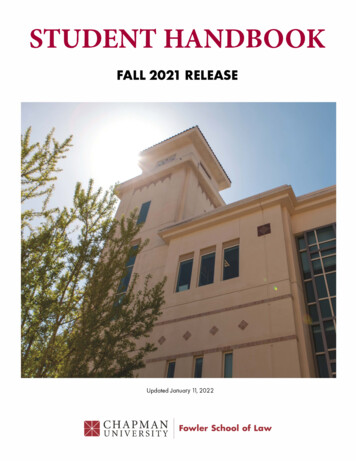
Transcription
STUDENT HANDBOOKFALL 2021 RELEASEUpdated January 11, 2022CHAPMAN UNIVERSITYI Sc h oo I of LawFower
TABLE OF CONTENTSACADEMIC POLICIES AND PROCEDURESI.Academic CalendarII.JD Learning OutcomesIII.Submission of Undergraduate TranscriptsIV.Graduation RequirementsV.Registration for CoursesVI.Grades and Grading StandardsVII. Grade Point AverageVIII. RankingIX.Withdrawals from a CourseX.Good Standing and ContinuationXI.Withdrawal from the Program and Leaves of AbsencesXII. AttendanceXIII. Policies for ExaminationsXIV. ReinstatementXV. Petitions to the Academic Standards CommitteeXVI. Appeal of a Final GradeXVII. Credit for Non-Law Graduate Level CoursesXVIII. Maximum Credits for Non-Law Classroom ActivitiesXIX. Admission of Foreign Students with ABA LL.M. DegreesXX. Policy on Military ServiceXXI. Externship PoliciesXXII. Emphasis CertificatesXXIII. Joint Degree ProgramsXXIV. LL.M. ProgramsXXV. Academic Registrar ResourcesXXVI. GraduationLAW SCHOOL, UNIVERSITY AND CAMPUS POLICIESI.II.III.IV.V.VI.VII.VIII.IX.X.Page 1Career Services (“CSO”) PoliciesScholarship PoliciesLibrary PoliciesLaw Review Membership PoliciesDiversity and Social Justice Forum Journal PoliciesDisability AccommodationsStudent ComplaintsHonor CodeUniversity Conduct CodeHarassment and Discrimination 344464747515657575858595960
TABLE OF CONTENTSXI.Posting of SignsXII. Animal PolicyXIII. Coronavirus Global Pandemic (COVID-19) Special PoliciesAPPENDIXI.II.Page 260606162ABA Standard 310Frequently Asked Questions Regarding the Fowler Schoolof Law Special Grading Policy for Spring 20206266
The Student Handbook (“Handbook”) of the Chapman University Dale E. Fowler School of Law(“Fowler School of Law”) is binding on all students. The Handbook is subject and subordinate toall applicable federal and state laws, any and all Standards for Approval of Law Schools andInterpretations of the American Bar Association (“ABA”), all standards for accreditation by theWestern Association of Schools and College, and any applicable standards by the State Bar ofCalifornia. This Handbook may be revised as necessary from time to time to conform toapplicable laws, rules and regulations, standards for accreditation, law school policy andprocedure changes, and Chapman University policies. All students are deemed to know thecontents of this Handbook in its current reiteration as so revised.ACADEMIC POLICIES AND PROCEDURESThe following Academic Policies and Procedures, as adopted by the faculty of the FowlerSchool of Law, are intended to be in accordance with our present understanding of the Standardsfor Approval of Law Schools and Interpretations of the ABA. It may be necessary to adapt thesepolicies and procedures to comply with these ABA Standards. NOTE: For purposes of theseAcademic Policies and Procedures, the term “semester” excludes both Summer and IntertermSessions.I.ACADEMIC CALENDARThe academic calendar can be found here: stering-classes/academic-calendar.aspx)II.JD LEARNING OUTCOMESThe Fowler School of Law faculty have identified the following JD learning outcomes as criticalto a law degree and to developing the skills needed to become a proficient grams/jd/index.aspx)III.SUBMISSION OF UNDERGRADUATE TRANSCRIPTSAll deposited students must submit their undergraduate transcripts indicating degree conferral tothe Office of Admission by August 1. Absent a determination by the Associate Dean ofAcademic Affairs that an extension is warranted due to extraordinary circumstances, any studentwho has not submitted an undergraduate transcript indicating degree conferral by October 15will be administratively withdrawn from the J.D. program on October 16. Extensions will onlybe granted in which extraordinary circumstances, through no fault of the student, may make itimpossible for the student to meet the October 15 deadline.Page 3
IV.GRADUATION REQUIREMENTS 1The Fowler School of Law confers the degree of Juris Doctor (J.D.) upon its qualified graduates.A student shall be a qualified graduate upon satisfying the following requirements:A.Credit Hours The successful completion of 88 semester hours of course work, including allrequired courses. In compliance with ABA Standard 310 (see Appendix), a “credithour” or “semester hour” or “credit” is an amount of work that reasonablyapproximates:o Not less than 50 minutes of classroom or direct faculty instruction and two hoursof out-of-class student work per week for fifteen weeks (including one week for afinal examination), or the equivalent amount of work over a different amount oftime; oro At least an equivalent amount of work as required in subparagraph (a) for otheracademic activities, including simulations, externships, field placements, clinicaland other academic work for which units of credit are awarded. Credit for courses will only be awarded where a student receives a grade of 0.7 orabove in the course; The maintenance of a cumulative grade point average of at least 2.0; and The completion of six semesters in residence (or the equivalent) if a full-time studentor eight semesters in residence (or the equivalent) if a part-time student.o Students are required to complete their law school studies within 84 months.Of the 88 credits needed for graduation, of which a number are satisfied by requiredcourses, no more than 16 credits may be acquired through externships, non-law graduatelevel courses or co-curricular activities (see Section XVIII). The list of required coursesis subject to change by the law school faculty when reviewing and revising the lawschool curriculum. The required courses a student must take in order to graduate isdependent, at least in part, on the student’s cumulative grade point average at the end ofthe student’s first year and/or the student’s class rank at the beginning of the student’sfinal full year of law school. Based on these factors, the minimum number of credit hoursin required courses may increase significantly depending upon the student’s performancein law school. In addition, the number of ungraded credits may drop from 16 credits to 7Requirements for the J.D. degree, as well as courses offered, may be changed by the faculty atany time.1Page 4
credits depending on the student’s cumulative grade point average at the end of thestudent’s first year. First-Year Curriculum: Required courses include the first-year full-timecurriculum: Contracts I & II, Torts I & II, Civil Procedure I & II, Civil ProcedureLab, Property, Legal Analysis Writing and Research I & II, and Criminal Law. Parttime students take all these courses except Criminal Law and Contracts I & II. Upper-Level Curriculum: Upper level required courses include Federal IncomeTaxation (which must be taken in a student’s second year of law school);Corporations or Business Associations; Constitutional Law, Evidence, ProfessionalResponsibility, and Practice Foundations Transactions. Students who took a full-timefirst year course of study must take Practice Foundations-Transactions in their secondyear, and those who were part-time students during their first year must take thiscourse during their third year of legal study.Students must complete two (2) Practical (Practice-Oriented) Writing requirements.Students must take at least two credits from a list of prescribed experiential coursesthat include but are not limited to Trial Practice, Client Interviewing & Counseling,Negotiations, Mediation, Arbitration, Clinics, Law and Motion, and Pre-Trial CivilPractice. These courses are marked as “experiential”, as defined by ABA Standard303(a)(3), in the course registration materials.Required courses for students that have a cumulative GPA below 2.6 at the end oftheir first year of law school (either full or part-time study) and transfer students asdesignated by the Associate Dean for Academic Affairs also include: CriminalProcedure/Police Practices, Remedies, and Wills & Trusts. In addition, students musttake Legal Writing Skills as a condition of graduation if (1) they received a grade of1.9 or below in Legal Analysis Writing and Research I or II (previously LegalResearch and Writing), (2) their LRW professor for either of these coursesrecommends that the student take Legal Writing Skills, or (3) if they are a transferstudent and are required to do so by the Associate Dean for Academic Affairs.Students with a GPA below 2.6 at the end of their first year of law school may notearn credits for graduation through Directed Research.The following requirements for graduation are not subject to variance or waiverunless otherwise provided in the academic rules:oooooPage 5Required number of hours.The requisite grade point average.Required courses.Residency credit.Writing requirements.
In exceptional circumstances, a variance to the rules for additional upper levelrequired courses may be granted, upon petition and at the discretion of the AssociateDean for Academic Affairs in consultation with faculty members when appropriate. Non-graded credits: For students with a cumulative GPA of 2.6 or above at the endof their first year of law school (full or part-time study), no more than 16 of thecredits needed for graduation may be acquired through ungraded courses such asexternships, non-law graduate level courses or co-curricular activities. For studentswith a cumulative GPA below 2.6 at the end of their first year of law school (full orpart-time study), no more than seven (7) credits may be acquired through ungradedcourses such as externships, non-law graduate level courses or co-curricular activities(see Section XVIII). Additional Graduation Requirements: All students entering their final year of lawstudy ranked in the bottom 25% of their class must take Selected Topics in AmericanLaw in the fall semester and Advanced Selected Topics in American Law in thespring semester. Residency Credits: To graduate, a student must receive at least six (6) residencecredits. No more than one (1) residence credit may be earned in a single semester.o In a given semester during the regular academic year, to receive one residencecredit, a student must receive credit for at least 12 credit hours of course work.Part-time students must be enrolled in a minimum of 8 credit hours of coursework throughout a Fall or Spring semester and must satisfactorily complete andreceive credit for at least 5 of those credit hours in order to earn fractionalresidence credit in a given semester. A student who in a given fall or springsemester is not enrolled throughout the semester in at least 8 credit hours ofcourse work will receive no fractional residence credit for that semester. If astudent in a given semester is enrolled throughout the semester in at least 8 credithours of course work and receives credit for at least 5 credit hours of course workbut less than 12 credit hours of course work, the student will receive fractionalresidence credit only in the ratio that the credit hours earned bear to the minimumof 12 credit hours required for a full residence credit.o To receive fractional residence credit in a given summer term, a student mustreceive credit for at least 3 credit hours of course work during the summersession. A maximum of one-half (0.5) residence credit may be earned for coursework completed during a given summer session. Subject to the limitation that nomore than one-half of a residence credit may be earned for study during a summersession, a student who receives at least 3 credit hours of course work will receiveresidence credit in the ratio that the credit hours earned bear to the minimum of 12credit hours required for a full residence credit in a semester during the regularacademic year.Page 6
o For summer study abroad programs, the rules regarding residence credit for studyduring a summer session will apply. Mandatory Professional Development Program:The Mandatory Professional Development Program (“PD Program”), administered bythe Career Services Office, introduces first-year students to the legal profession, itscore values, and the core competencies required to succeed. Students must completefive (5) sessions from the PD Program to be eligible to graduate from the FowlerSchool of Law. Students who do not meet this graduation requirement during theirfirst year must complete outstanding sessions by graduation. Because PD programevents are a graduation requirement, attendance is mandatory for all first-yearstudents. As a result, it is an Honor Code offense to misrepresent one’s own oranother’s attendance or absence from such an event. This would include signing in foran event and leaving before the event’s conclusion. To receive credit for a PDProgram event, students must arrive on time, sign-in, and stay for the entire program.If a student leaves a PD Program event early or arrives late, they will not receivecredit. Questions regarding the PD Program should be directed to the Career ServicesOffice at lawcareerservices@chapman.edu.B.Compliance with ABA Standard 310For the ABA Standard 310 Compliance Policy of the Fowler School of Law, seeAppendix of the Handbook.C.Page 7The Writing Requirement General Requirements: Prior to graduation, all students must satisfactorily completetwo practice-oriented writing courses as defined below. Ordinarily, students shouldsatisfactorily complete one writing project in each of their second and third years oflaw school. The Practice-Oriented Writing Requirement: Students may satisfy the practiceoriented writing requirement by the production of one or more documents that requirestudents to engage in the kind of legal writing that lawyers undertake in the practiceof law. The writing assignments must be designed to develop the students’ practicallegal writing skills and must be of the scope and complexity ordinarily suitable as awriting sample appropriate for submission to a potential employer. Practice-orientedwritings include both litigation-type documents and transactional documents.Examples of documents that likely would qualify as a practice-oriented writing(because of the amount of writing and independent analysis involved) include, but arenot limited to, legal memoranda, motions, briefs, opinion letters, settlementagreements, and discovery documents that require more than standard questions (such
as deposition outlines, requests for admissions tailored to client facts, etcetera).Examples of documents that likely would not qualify as a practice-oriented writing,without approval from the Associate Dean for Academic Affairs, include standard ortemplate discovery documents and standard lease forms or contracts that involve nomore than cutting and pasting. Satisfaction of the practice-oriented writingrequirement must involve a close working relationship between the student and thesupervising faculty member. How Satisfied: The practice-oriented writing requirement may be satisfied by studentproduction of any of the following:o Substantial additional research or revision of a document or documents inconnection with an upper-level course, clinical program or seminar (as designatedeach semester by a full- or part-time faculty member, and with the approval of theAssociate Dean for Academic Affairs).o A writing originally undertaken as part of an externship or moot court or similarinterscholastic competition if a full-time faculty member agrees to supervise itsrevision.Students may not take Practice Foundations-Transactions to fulfill either of therequired practice-oriented writings.Regarding subsection (a), the burden is placed upon the faculty member toestablish to the Associate Dean for Academic Affairs, prior to the beginning ofRegistration for the upcoming semester in which the course will be offered, thatthe document production required in the course, clinical program or seminarsatisfies the general requirements for practice-oriented writing, as describedabove. In meeting this burden, the faculty member need only submit the coursesyllabus to the Associate Dean for Academic Affairs clearly indicating thedocument or documents to be produced. Continuing approval under thisrequirement is available for recurring courses. It is possible that a course could beapproved to satisfy both the practice-oriented writing and the lawyering skillsrequirements, but a single course may not be used by a student to satisfy bothrequirements.In general, no practice-oriented writing project consisting of less than 20 pageswill satisfy the practice-oriented writing requirement. However, in specialcircumstances (typically involving the amount of time and effort expended on theproject) a faculty supervisor may, in his or her discretion, seek approval of theAssociate Dean for Academic Affairs to reduce the minimum number of requiredpages, provided that no paper(s) shall be less than 15 pages. If a student submitsmore than one practice-oriented document to satisfy an upper-level writingrequirement, then the documents, considered together, must meet the 20-pagePage 8
minimum (or the minimum approved by the Associate Dean, in the event thesupervising faculty member seeks a reduction in the minimum number of pages). Particular Requirements re: Revision of Writing Originally Undertaken for anExternship or Interscholastic Competition: Student proposals for satisfying thepractice-oriented writing requirement through revision of a writing originallyundertaken in connection with an externship or interscholastic competition mustinclude a detailed topic description and an estimate of the time requirement forcompletion of the project. The supervising faculty member will require an outline anda draft in addition to the final paper. The supervising faculty member and student willmeet on a regular basis to discuss the progress of the paper. The supervising facultymember must ensure that the writing involves substantial original research andadvocacy.All revised externship and competition writing will be graded. The supervisingfaculty member will notify the student in advance of all requirements for the projectand shall determine the number of credits to be awarded for satisfactory completionof the project (ordinarily one credit will be awarded).Students will receive credit for a practice-oriented writing paper for studentsatisfaction of the practice-oriented writing requirement in a course that is designatedto meet this requirement as approved by the Associate Dean for Academic Affairs.D. Particular Requirements re: Completion of a Practice-Oriented WritingRequirement in Connection with a Course, Clinical Program or Seminar: Eachfaculty member supervising a student’s practice-oriented writing in connection with acourse, clinical program or seminar shall provide a list of all students in the upperlevel course, clinical program or seminar who have met the requirements of thepractice-oriented writing, and shall certify the accuracy of the list. In addition, theregistration materials provided to students in advance of registration will indicatewhether a course, clinical program, or seminar satisfies the practice oriented writingrequirement, in view of the fact that a course or seminar taught by one professor maysatisfy the requirement, while the same course or seminar taught by a differentprofessor may not. Certifications in General: All certifications must be submitted to the Registrarwhen the faculty member’s grades are due at the end of each semester.Directed ResearchStudents must obtain advance approval from the Associate Dean for Academic Affairs toearn academic credit for Directed Research. Student proposals for Directed Researchmust include a detailed topic description and an estimate of the time requirement forcompletion of the project. The supervising full-time faculty member will require anPage 9
outline and a draft in addition to the final paper. The supervising faculty member andstudent will meet on a regular basis to discuss the progress of the paper.Student members of the Law Review must undertake Directed Research in the springsemester of their second year of law study.Any student whose cumulative grade point average at the conclusion of the first year oflaw school (either full or part-time) is below 2.6 may not participate in DirectedResearch.No faculty member may supervise more than two Directed Research projects in onesemester without the prior approval of the Associate Dean for Academic Affairs. AllDirected Research projects will be graded. The supervising faculty member will notifythe student in advance of all requirements for the project.E.Honors at GraduationThe criteria for graduating with honors is as follows:Summa Cum Laude Top 1% of the graduating classMagna Cum LaudeCum LaudeTop 5% of the graduating classTop 15% of the classPlease note that class rank percentages are not rounded to the nearest percent.Therefore, a class rank of 15.1% is top 16%.V.A.REGISTRATION FOR CLASSESRegistration PoliciesFull-time students complete the requirements for the J.D. degree in three (3) years. Fulltime status is based on enrollment in 12 to 16 credits in a semester. Students complete adesignated first year course of study and generally complete 14 to 16 credits eachsemester on average thereafter. Students who wish to transfer from full-time to the parttime program must submit a petition to the Assistant Dean for Student Affairs. Thepetition is subject to approval of the Associate Dean for Academic Affairs. Part-timestudents complete a designated first year course of study and generally complete 8 to 11credits per semester thereafter. Part-time students complete the requirements for the J.D.degree in no less than four (4) years. However, in most cases, it is expected that parttime students will meet the requirements for graduation after attending nine or moresemesters. Absent approval of the Associate Dean for Academic Affairs, part-timestudents must complete their course of studies within six (6) years. Students who wish totransfer from part-time to the full-time program must submit a petition to the AssistantDean for Student Affairs. The petition is subject to approval of the Associate Dean forAcademic Affairs. When considering such a petition, the Associate Dean will evaluatePage 10
several factors including, but not limited to, the student’s academic performance in his orher first year of law school and the student’s work and co-curricular activities.Procedures and scheduled times for registration must be followed in all cases, includingDirected Research, Co-Curricular, and Non-Numeric Graded Courses, such asExternships, Skills Competitions, Law Review or Diversity and Social Justice Forum.Registration is not complete until all charges are paid or arrangements for payment havebeen made in the Business Office. No academic credit shall be given for courses forwhich students have not properly registered.The faculty has enacted a strict policy concerning competition credits. Registration forany type of competition must be completed within the first 30 calendar days of theacademic semester in which the student will be competing, but prior to the competition.Students are not allowed to register retroactively for a competition in which theycompeted in an earlier semester. However, in unusual circumstances, and with theapproval of the Associate Dean for Academic Affairs and the Faculty Advisor, a studentmay be allowed to register for a competition after the first 30 calendar days of theacademic semester in which the student will be competing. In no event shall students beentitled to receive credit for intra-mural competitions. Nothing in this policy changes therule prohibiting a student from enrolling in an overload without the permission of theAssociate Dean for Academic Affairs and without paying additional tuition.All first-year students, both full and part-time, are registered in course sections by theRegistrar’s Office. First-year students may not add or drop classes except that a first-year,full-time student may drop to first-year, part-time status with approval from the AssociateDean for Academic Affairs. All first-year, part-time students shall pursue the same courseof studies. A first-year student changing status from full-time to part-time, or vice versa,shall be subject to the rules otherwise applicable to the change of sections.Regular and punctual class attendance is necessary to satisfy residency and class hourrequirements.Full-time students may not register for more than 16 credit hours per semester withoutpermission of the Associate Dean for Academic Affairs and no student may take morethan 17 credit hours in a given semester. Students will be charged an additional per credittuition fee for the credit hour taken in excess of 16 credits. The maximum credit limitapplies to all students including those in joint degree JD/MBA and JD/MFA programs.Part-time students may not register for more than 11 credit hours per semester withoutfirst receiving written permission from the Associate Dean for Academic Affairs. Parttime students also may not register for less than eight credit hours per semester withoutfirst receiving written permission from the Associate Dean for Academic Affairs.To receive credit for a course, the student must matriculate in the course, and successfullycomplete it with a grade of 0.7 or higher. Contracts I, Civil Procedure I, Legal AnalysisWriting and Research I, and Torts I are prerequisites for Contracts II, Civil Procedure II,Legal Analysis Writing and Research II, and Torts II, respectively.Page 11
B.Changes between course section/first-year tracks: Students who wish to changesections of the same course may do so only upon a showing of extraordinarycircumstances via written application to the Associate Dean for Academic Affairs andwith the approval of the Associate Dean for Academic Affairs and the professors ofthe two sections.Auditing CoursesChapman University alumni and current law students will be able to audit courses at theSchool of Law at no charge based on the following terms and conditions: Alumni must be attorneys. This is not limited to attorneys who earned their lawdegree from the Fowler School of Law. Alumni must choose from a select pre-approved list of courses that are determined bythe Fowler School of Law to be feasible for audit and dependent upon spaceavailability. Members of the law faculty have the prerogative to turn down a request for an auditorto take their class. A maximum of two (2) persons may audit a course at any time and based on spaceavailability. The University will waive the audit fee for current law students attending the lawschool and as long as the number of credits is within the allowable enrollment caps.For example, a maximum of 16 credits for full-time students and a maximum of 11credits for part-time students for enrolled and audit credits combined.Non-Chapman University students may audit courses as long as they are currentlyenrolled law students in good academic standing at ABA approved schools, or CaliforniaState approved schools, or a current member of a State Bar. Tuition will be charged on aper credit basis.C.Transfer of CreditsGeneral rules applicable to all transfer of credit scenarios are: No more than forty-two (42) academic credits shall be accepted for transfer duringthe student’s career at the Law School. All courses required for graduation must be successfully completed at the LawSchool, except for comparable courses successfully completed by transfer students attheir previous institution and approved for transfer credit by the Associate Dean forAcademic Affairs.Page 12
All course work must either be taken at an ABA-approved law school or in an ABAapproved program. The Associate Dean for Academic Affairs has the discretion to approve or disapprovethe transfer of credit in those instances where the grade for a course is 2.2 or below orthe equivalent. The law school will not transfer credit if the grade received in thecourse(s) completed at the other law school is below 2.0 or its equivalent. All grades for which credit is transferred will be reported as “pass” for the purpose ofcomputing academic averages of the student at the Law School. All requests for summer or interterm transfer credit must satisfy the followingstandards:o No more than six (6) credit hours will be transferred.o The inability of the student to take the courses at Chapman University becausethey are not offered by the Law School.o The residency requirements for graduation remain in effect.o The student’s cumulative grade point average is 2.0 or higher.o The student may not currently be the subject of academic suspension.o The student receives pre-approval by the Associate Dean for Academic Affairs.o All requests for transfer credit shall include the course descriptions for thecourses.o All grades for which credit is transferred will be reported as “pass” on the FowlerSchool of Law transcript and for the purpose of computing academic averages ofthe student at the Law School. The only exception is for courses transferred fromprograms co-sponsored by the Fowler School of Law or programs otherwisespecifically approved by the Chancellor of Chapman University in which casewhich the actual grades earned in the program are posted on the Fowler School ofLaw transcript.o Approved transfer courses must be taken for a letter or numeric grade andstudents may not elect to take the courses for Pass/No Pass credit.Page 13
D.Visiting StudentsThe Associate Dean for Academic Affairs may approve the petition of a studentrequesting visiting student privileges if the visit would serve the best interests of both thestudent and the Law School, if the petitioner’s cumulative grade point average at the LawSchool is 2.0 or higher; the petitioner is otherwise in good standing; and if either: The petitioner has a special interest in taking a con
Jan 11, 2022 · The Student Handbook (“Handbook”) of the Chapman University Dale E. Fowler School of Law (“Fowler School of Law”) is binding on all students. The Handbook is subject and subordinate to . residence credit in the ratio that the credi
